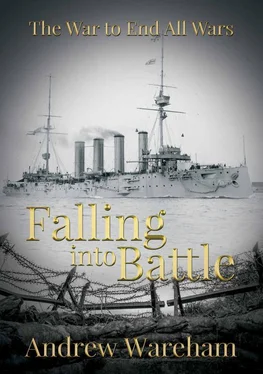“I am due for France on Friday, O’Grady.”
“With luck, sir, I could be as well.”
Richard nodded – he could say no more to a private soldier but he would ask for O’Grady to be part of his D Company when he went back.
“3 rdBattalion offices, sir.”
“Thank you, O’Grady.”
O’Grady saluted and marched back to the gate, taking pains to keep an even pace, knowing that he was a marked man for many of the officers.
“Delivered him to the offices, Sarge. A quiet-spoken gentleman, and polite.”
“Right sort or wrong, Paddy? You was in South Africa. You seen ‘em.”
“He’ll do, Sarge. He’s one of them got pushed into a corner and came out fighting. Not no glory boy, this one.”
“You want to go out with him, Paddy?”
“Sure, and why not? I’ve seen worse than that one.”
The offices were part of the original Victorian barracks dating to the Cardwell reforms of the mid-Victorian era, brick-built and shabby despite being scrupulously clean – they were old.
An elderly major spotted him through his open door and bustled out to greet him, saluting first.
“Sir! Captain Baker, D Company, reporting, sir.”
“Welcome, Captain Baker. Major Pavenham, brought back for the duration to man the depot. All of the young men are joining you in France.”
“It’s the only place to be, sir – and we can’t be there without men to do the necessary work at home.”
Pavenham recognised that for belated tact – the boy had manners.
“I tell meself that, Baker – but it’s not the place for an old warhorse, sat on me backside and sending youngsters out to do the work!”
Richard managed a smile, thinking the old fart to be unnecessarily tedious – he was past it and should be sat back thankful to able to do anything useful.
“The adjutant has organised a room for you, Baker, and there is a tailor waiting on your convenience. I gather you lost everything in France.”
“Too many young men lost more than me, sir. I am not too concerned to have had my wardrobe destroyed. I will say that I will be glad to have more clothes than the uniform on my back, and that borrowed for the original being too ragged and dirty to be salvaged.”
Pavenham laughed and shook his head.
“We’ll deal with that first, Baker. Say at about ten o’clock I will introduce you to your lieutenants – a first and a second.”
“Very good, sir. What of sergeants, sir? I have one good man in France but could benefit from another, younger fellow.”
“And sergeants are more important to a fighting company than green officers? I know. Saw the same in South Africa – you’re right. Sergeant Painter is an experienced hand and will have the draft paraded for your inspection for eleven.”
“Thank you, sir. There was a private at the gate, O’Grady, who looks to be the right sort for the fighting we shall be seeing…”
“Shocking record, the man has, Baker. Made sergeant once and corporal twice since then, Broken down for drunkenness all three times. Fighting mad in the wet canteen.”
“Not much in the way of liquor up on the front line, sir.”
“He’s yours if you want him – there’s too much booze here at depot.”
“Please, sir. I think he could be an asset when we get back to business.”
“I’ll see that he joins your people this morning, Baker. If you want him – well, it’s the least we can do for you. I have your instructions for tomorrow, Baker. Simple enough, as long as you present yourself on time - and we shall send you down in a staff car. You will be guided through the ceremony, or so I am told, never having been there myself!”
Richard smiled again and allowed himself to be led to his quarters, a single room but far larger than a junior captain might expect.
The gentleman from Gieves was waiting, together with a flunkey to do the work if the fittings showed need for alterations. To his satisfaction, all was well.
“As it should be, sir. One does not expect to find errors at Gieves! I will pass the word that further fittings are unnecessary.”
Full dress for the investiture, breast blank apart from a little hook for the King to place the actual Cross. Beside it was a pile of mess undress and working uniforms and two dozens of shirts and underclothes and stockings.
“Boots and shoes, sir. As I know you lost everything in France, I have ventured to purchase for you, sir, to foot size. Obviously, we have no lasts for you and could not construct proper footwear in the time available – leather will not respond to demands for haste, sir!”
Richard made his thanks, suggested that he would not have too great a need for style in France.
“I shall be up to my knees in mud and muck more often than not, I suspect, sir! Winter is coming before too long.”
The tailor shuddered at the prospect – he did not appreciate the thought that his clothing might be subjected to such vulgarity as wading through rain- and snow-drenched fields.
“I am to return to France on Friday, sir. I do not know what the postal arrangements might be but fear it will be difficult to send you my cheque in good time. Would it be possible to meet your account now?”
“Not at all, Captain Baker! There will be no account, sir. I am instructed most straitly to accept nothing from you on this occasion, sir. Men who have lost all, and have offered their lives in process, are not to be dunned by a mere tailor! It is our honour, sir!”
“You are very good to me. Thank you.”
That was two hundred and more saved, Richard thought. A Cross was worth having!
An ancient private reported as the tailor left, bowing his way out.
“Beg pardon, sir. I am to be your batman for the week, sir. Not to accompany you to France, sir, on account of flat feet what I got, and being too old for active service, sir, but I can turn you out proper while you’re here, sir. Suggs, sir.”
“Good. I am glad to see you, Suggs. The tailor has just left a great mass of clothing and I was wondering what to do with it.”
“You don’t do nothing, sir. I will. Need to get a trunk, sir. Officer’s clothing, for the use of. Buy one in town, sir. Two different places you can get one, sir, in Bedford.”
Richard had lost his original naval officer’s trunk, had not thought as far forward as to purchase a replacement.
“I’ll do that later, Suggs. I have to meet the company officers now.”
He marched off, Suggs pointing the way for him.
He passed the drill square, taking care not to notice the stumbling incompetence of the platoons of very new recruits. He came to attention as a sergeant-major roared them to present arms to the officer.
The sergeant-major stamped and bellowed and made them repeat the evolution three times over before he was satisfied.
“Beg pardon, Captain Baker, sir, but these green objects need to learn what’s right, sir!”
“Very good, ‘major. Carry on.”
Richard was wise enough in the ways of the military not to state agreement with the sergeant-major. There was no need to tell the warrant officer that he was right – in the nature of things, he was never wrong, did not know how to be.
Lieutenant Willoughby opened the door for Richard to enter the offices and stamped very loudly as he came to attention. Second Lieutenant Presteigne did his best to repeat the performance, showing how very green he was.
“Willoughby, sir!”
“Presteigne, sir!”
“Captain Baker. I am pleased to meet you, gentlemen. I much hope that we shall work well together. We are due to go to France on Friday and will expect to be in the line within a very few days thereafter. I need not say that I know you will do your best. I will say that your best must be unfailingly excellent – the men have the right to be led by officers of the highest quality. We shall take a large draft out with us and must bring them up to the standard of the survivors of the original company. We shall get to know each other quickly in the field, so just a brief introduction will suffice now. Mr Willoughby, what can you tell me about yourself?”
Читать дальше












